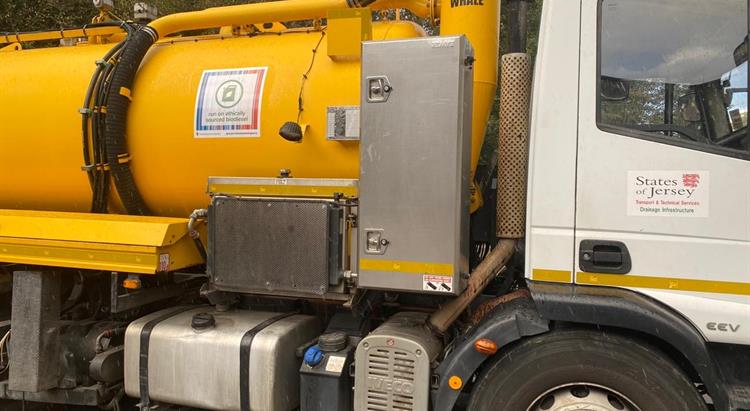28 October 2020

A trial of government vehicles to test the feasibility of biodiesel as a replacement for diesel fuel is underway.
The ethically-sourced biodiesel, also known as second-generation biofuel, is created from non-edible biomass such as waste from food crops and does not contribute to greenhouse gas emissions in the same way as fossil hydrocarbons like diesel.
The six-month trial is part of work to evaluate if biodiesel could be a viable alternative to diesel in Jersey. Transport is the largest of Jersey's greenhouse gas emission sectors, with 32% coming from road transport alone. Diesel use in Jersey has been steadily increasing since the early 1990s and made up 45% of road fuel used in 2018.
The trial involves nine commercial vehicles, including a road sweeper and dustbin truck, which can be identified by the stickers placed on their doors. The number of miles the vehicles travel, the amount of fuel they use, and the additional cost of biodiesel compared to diesel will be recorded.
Deputy Kevin Lewis, Minister for Infrastructure said: “Once the trial is completed, we will have a clearer picture on the benefits of using biodiesel as an alternative to diesel fuel. I hope the results will encourage those who rely on diesel vehicles to switch to a more environmentally friendly form of transport.
“I would expect the number of diesel-powered vehicles on our roads to fall over time, but this is a chance for owners to ensure that they become carbon-neutral for the remainder of their operational life.”
The trial is part of the Sustainable Transport Policy’s Strong Start Delivery Plan, which included the action was to investigate the feasibility of sourcing and using biodiesel in commercial fleet vehicles.
Data from the six-month trial, including anecdotal data from drivers on how the vehicles perform using biodiesel and how much it will cost, will help inform the development of both the Carbon Neutral Strategy and the STP, which are intend to move towards the eventual phasing out of petrol and diesel cars and biodiesel could prove a useful fuel to help transition away from diesel fuel.
For measurement purposes, the trial started in August 2020 to allow the test vehicles to be empty of any left-over diesel fuel before running exclusively on biodiesel. The trial runs until the end of January 2021 and results will be published in February.